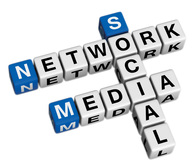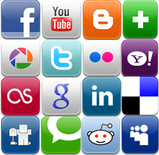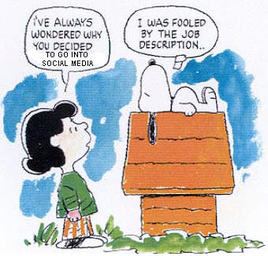
Our world is rapidly changing and evolving. Looking back just ten years, the world can look as out of date as the Victorian era. It is now common for people to have cell phones and even more common for those cell phones to be used for more than just calls. With incredibly powerful cell phones, tablets and increasingly affordable laptops, people are more connected than ever. One of the major results is that people are flocking to social media sites like Twitter and Facebook and not being active in these places can limit your ability to be as effective as possible. But the social media scene can be frightening and needs to be used effectively to be worth it. Let's take a look at some things you should know about this new frontier.
The first thing to mention is that when using social media, it is most important to actually use it. You need to be active on Twitter and Facebook to see the best results. It doesn't have to be a huge time commitment, but you need to monitor your account and you need to interact with people. Twitter in particular has conversations that happen quickly and you can lose people with late responses. If you don't have time to be active for at least an hour spread out over the course of a day, social media may not be the best way for you to operate.

If you are already doing a blog or newsletter, you can integrate these as part of your social media strategy. While you can't post an entire blog to Twitter, you can link to your new blog posts to drive people to your site. Even sending out short pieces of trivia or relevant, interesting quotes daily can be a good way to keep people interacting with you. Building relationships is an important part of any social media plan but keep in mind that anything you put out there is very public. It is important to interact with people and not just use it as a broadcasting service. You need to consider what you post and make sure it isn't just being used to advertise as this can easily turn people off.
Both Facebook and Twitter can be used together but you'll get a richer experience when these services are integrated with other online resources like a blog, website or video sites like YouTube and Vimeo. While you want to have a range of social media options, you also need to be careful not to overwhelm your audience (or yourself) with a lot of unnecessary options. For example, if you like to share photos and have a Twitter account, you likely do not need an Instagram account. Twitter is great for quick, short messages and interaction, Facebook allows for moderate to long posts and you can set both so that posts on either show up on both. If you need to make a longer post, I would suggest using a blog as Facebook and Twitter are better with shorter posts and interacting with people. Videos on YouTube and Vimeo can be shared on your site, Facebook or Twitter.

Before you start, you need to pick how you are going to use social media. Are you going to use it to try to drive people to your website? Are you just wanting to interact more with your community? Or are you trying to increase awareness? Perhaps a combination of all of the above. It's important to know what you want to accomplish with your social media platform and then to focus your efforts. If you want to drive people to your website, you'll need to use it to draw people to your site. If you want to interact with the community, you'll need to be much more active on the various platforms.

There can be reluctance to use social media as there is a lot of misinformation and it is a very new area. There are some important things to keep in mind to keep yourself safe. The biggest thing to keep in mind is that you're posting to a public forum, whether it is YouTube, Twitter, Facebook or your own site. Things on the internet, although they can usually be edited or deleted at the source, tend to remain forever. Be very deliberate about what you share and who in your organization can share it. Links are a very common occurrence, especially on Twitter, and need to be approached carefully. If you receive a random message from someone with a link, don't just click on it. As most people use applications to shrink URL lengths, deciding which links are safe to click on can be much more difficult, even when they come from a trusted source. The best rule is if it seems fishy, don't click on it. Other standard security precautions should always be taken.
The best way to start using social media is just to start using it. It might just be a small presence, with a Facebook page that you list upcoming events or using Twitter to share bits of things you are working on or get a bit of feedback. Don't feel like you need to do everything at once. Take it slowly and it will come over time. Trying to bite off too much can ruin the experience and be very overwhelming when you are starting out. Taking it slowly, one step at a time is the best way to get started.

 RSS Feed
RSS Feed
